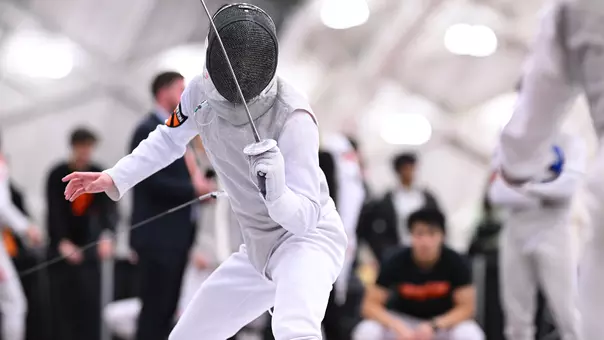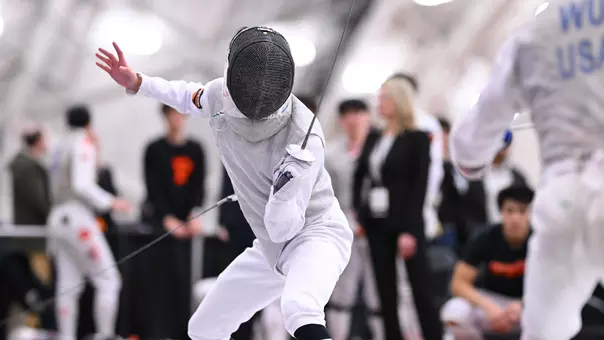Princeton University Athletics
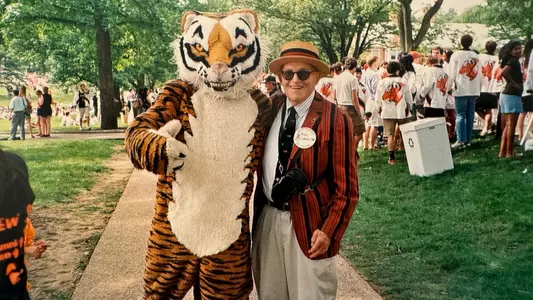
For International Holocaust Remembrance Day, Celebrating Alan Lukens: Princetonian, Diplomat, Family Man — And Liberator
January 26, 2024 | General
We counted 37 of these cattle cars full of dead bodies. These were what the French used to call 40 and 8. In the first war, they were made for 40 men or 8 horses. But actually, they had something like 200 men in these. — Alan Lukens
* * *
It is the first week of November 1942. Across the world, war rages non-stop. The Allies are invading North Africa. The Nazis are closing in on Stalingrad. The fighting between United States Marines and the Japanese on Guadalcanal shows no signs of ending any time soon
Life at Princeton University is trying to go along as normal. The Tigers will play Dartmouth and Yale to finish the 1942 football season. The Triangle Club is rehearsing for its upcoming show.
Alan Lukens is 18 years old. He is a few months into his freshman year at Princeton University, having come from the Philadelphia Main Line and Episcopal Academy. His focus this week is on the freshman class sailing finals, for which he is one of eight qualifiers after three weeks of preliminaries.
What does he know of the horrors taking place so far away?
Alan Lukens will graduate from Princeton in 1948. He’ll earn a letter in lightweight rowing and 150-pound football. He’ll study international affairs, a precursor to his four-decade career in foreign service. He’ll write a senior thesis on French foreign policy in the immediate aftermath of the war.
What he won’t do is keep any remaining pretense of innocence. Those days of freshman sailing races? His innocence ended at the finish line, or at the very latest, when he enlisted in the Army a few weeks later, taking advantage, like many of his classmates, of a wartime program that enabled him to do his first two semesters from June through January before withdrawing to enlist.
If they did so out of a sense of patriotism and glory, that too would be shattered soon. The horrors taking place so far away? Alan Lukens suddenly would find himself with a front-row seat to the worst of the worst of it.
When Alan Lukens was 18, he was a Princeton freshman. When he was 22, he was back on campus.
In between, he helped liberate a concentration camp.
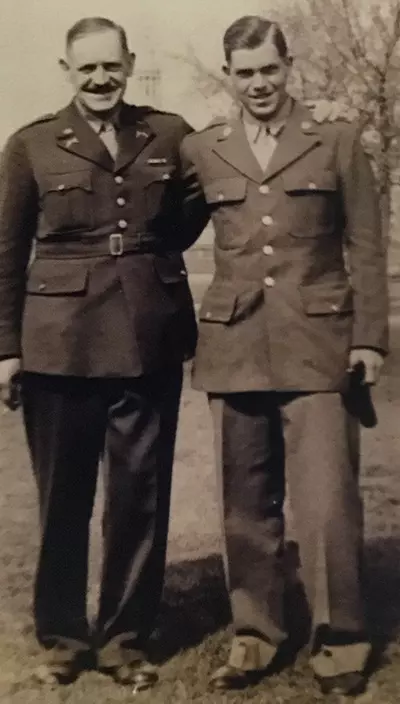
The story of Alan Lukens is a complex one, with experiences that touch every conceivable emotion a man can feel. Where do you begin to talk about a life with so much joy and so much tragedy, so much devotion to family and so much heartbreak that came along with that?
It begins with a simple word: Reunions.
There is “Reunions,” capital “R.” And there is “reunions,” small “r.”
“Alan loved Princeton,” says Susie Lukens, his wife from 1962 until his death in 2019 at the age of 94 (in fact, Alan Lukens would have been 100 years old this coming February 12).
His father Edward was in the Princeton Class of 1915, and he had two Princeton uncles, Alan in the Class of 1913 and Lewis in the Class of 1917. All three brothers would serve in World War I. Only two would come back.
Uncle Alan was one of 26,000 American soldiers killed during the Meuse-Argonne offensive, which was the final drive of the Allies in World War I; an Army Captain, he died in Verdun on Sept. 29, 1918, just six weeks before the war’s end.
His nephew was born on Feb. 12, 1924, and named after him. Alan’s maternal grandfather was the famous architect Frank Miles Day, who designed nine buildings on Princeton’s campus and was also the architect for the original design of Franklin Field and Weightman Hall at Penn.
Luken’s father would become a lawyer after the first World War but would go back into the Armed Forces during World War II, even getting wounded in 1944, before he came back to teach at the University of Virginia. With his own experiences overseas, Alan Lukens wanted to be in the foreign service.
“His experience at Princeton was huge part of his life,” says his son Lewis Lukens, a member of the Princeton Class of 1986. “He was an incredibly loyal alum. We even played ‘Old Nassau’ at his funeral.”
Alan Lukens was a regular at Reunions, major year or not. He loved the P-Rade and insisted on walking on his own, as opposed to riding in a golf cart, well into his 90s.
“I don’t want to say the P-Rade was his favorite thing in the world,” Susie says, “but he did love it so. He was such a people person. He loved people. He loved waving to everyone.”
“Princeton was his other family,” says his youngest child, Tim.
Both Lewis and Tim rowed in college. Unlike his brother, Tim attended Colgate — “Princeton didn’t want me. I had a little too much fun in high school.”
“The friendships that he made at Princeton and the connection he felt to Princeton were such important pieces of his life,” Tim says. “They were foundational. They gave him the strength to get through challenging times. His friendships there were lifelong. Any way he could support the University, he did, because Princeton really gave him a lot of strength to get through his difficult times.”
After graduation, Alan began a career that would see him stationed all over the world. His stops included Istanbul, Martinique, Guadalupe, French Guyana, the Central African Republic, Paris, Morocco, Dakar, Nairobi, Copenhagen, South Africa — even U.S. Ambassador to the People’s Republic of the Congo — before settling in Washington, D.C.
The picture that the Lukens family paints of Alan is one of a man who loved life, an outgoing man who never met someone he wouldn’t talk to, stranger or not.
“Everybody loved my dad,” Tim says. “He would just light up a room. He was a diplomat, and he was incredibly social. He had an overly happy demeanor that made people feel good about themselves. He was able to bond with all sorts of people. He was very social, very positive. He had an extraordinary life.”
“He loved people,” Lewis says. “He loved interacting and engaging with people. That’s why he was such a great diplomat. He was always interested in other people’s lives and their stories. It gave him an incredibly broad world view. Much of his adult life was spent in Africa. What he loved about the diplomacy was the people, the interactions. He loved hearing people’s stories and telling them the American story.”
Tim told the story at his father’s funeral about how his father approached airplane flights. He’d wait for the second the fasten seatbelt sign would go off and would immediately get up and start walking around the plane, talking to everyone and anyone.
“He could find a connection with anyone,” Lewis says. “He’d find someone to talk to and engage them in conversation and suddenly he had a new best friend. He’d literally stay in touch with them for years and years.”
“To him,” Tim says, “a plane flight was a cocktail party in the sky.”
Alan and Susie also had two daughters, Francie and Susie, twins who both went to St. Lawrence. This actually was his second family.
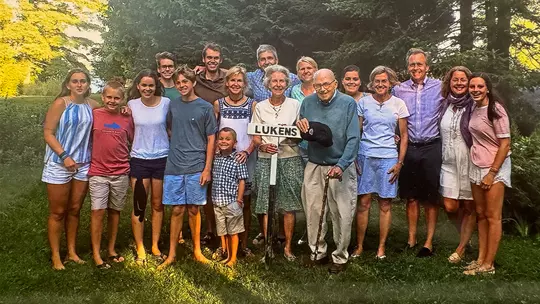
Alan Lukens was the president of the ski club during the fall semester of 1942, and so when it came time to enlist, he joined the 10th Mountain Ski Division and was sent to Camp Hale, Colorado. It turned out to be more than just a ski holiday.
It actually was mostly standard Army basic training, with some skiing on the weekend. He eventually scored the highest at the camp on a test to study languages, and so after eight months in Colorado he was sent to learn Turkish in Nebraska, where he spent more time going to Cornhusker football games in the fall of 1943 than anything else. The language program was canceled after two weeks, and so he was next sent to Indiana to study engineering. That too was scrapped, as was the 10th Mountain Ski Division all together, and he was folded into the 20th Armored Division at Fort Campbell, Kentucky.
Instead of being part of an Officers’ Candidate program, Lukens instead was a private. His training would last all through 1944, and he was finally sent to France early in 1945 as part of the 20th’s 413th Armored Field Artillery unit. He would go through France, Belgium and Holland before crossing into Germany with the U.S. First Army. It was there that he first encountered combat.
It was also there that his unit was moved from the First Army to the Third Army, under the command of General George Patton. His unit moved quickly towards Munich, eventually meeting up with the Seventh Army and its 42nd and 45th infantry divisions. The 20th was still the only armored division.
The fighting was pretty intense, and there were significant losses within his division.
“Every night they had the famous ‘Bed Check Charlie,’” Alan Lukens said during an interview in 2017. “It was a German plane that would come over every night and drop some bombs. And then there were some 88s, the big German cannon that fired at us. What we had in our artillery was called an M7. It was a 105 tank with a howitzer on top. It was a very unwieldy weapon. We had four together in a battery. I was the one who had to do the trigonometry and decide where these four would aim. So we were, most of the time, somewhat back in artillery, but then as things went fast, many times we were right up on the front lines, where prisoners were coming out. I actually took some prisoners along the line. This was all happening towards the end of April. All we knew was we were heading for Munich, and we knew the big SS headquarters north of Munich, which later became an American base, was very heavily fortified.”
What they didn’t know is that they were about to stumble across something completely unknown to them. And even if they knew it was there, they never could have imagined what they’d see.
Shortly after Alan Lunkens’ ninth birthday in 1933, the Nazi SS opened one of its first concentration camps, with an original purpose of housing those considered political opponents and dissidents. It was to be set up 10 miles outside of Munich, on the outskirts of a small town whose history went back to the ninth century. The name of the town, and the concentration camp, was Dachau.
There were other camps, actual extermination camps, that would have higher death rates, especially the ones in Poland such as Chelmno, Treblinka and especially Auschwitz-Birkenau, where 1.3 million people, 1.1 million of whom were Jews, were murdered. Auschwitz was liberated by the Soviet Red Army on January 27, 1945, which is now recognized as International Holocaust Remembrance Day.
Dachau was a camp built around slave labor and punishment, and 41,000 people would ultimately be murdered there. It would be the longest operational concentration camp of the Nazi Regime.
Its liberation would not come until April 29, 1945. The first to reach the camp would be the American 42nd and 45th Infantry Divisions, with elements of the 20th Artillery Division. Alan Lukens would be one of those members of the 20th, and the horror he’d see first-hand was unimaginable.
This is how he described it:
So anyway, all of a sudden, we come to this enormous camp — totally surprised all of us — where we saw these watchtowers. And the whole camp was ringed by a moat, and a barbed wire fence. So we got that close. We used our tanks to smash the barbed wire and to cross the moat. Just at that time, there was one tall building, which was where the German headquarters were. And they had a white flag out, and we thought that was fine, we'd just go on in. But then despite the white flag, they had snipers, and they started shooting at us. And they actually killed our poor Colonel. He was, at that point, his — I don't know. His Jeep had broken down, or he was standing up on another Jeep. And I didn't know him well, but, of course, that was a shock for all of us. Later on in life — way later — I got to know his son quite well, who was a West Point Colonel, who helped me much later when I was head of the 20th Armored Division veterans and we had a reunion at West Point. It was terrible. Then when he was shot, they were also shooting other people from there. Then what we did was get our artillery ready, and we shot a blast at this building. And that was the end of that. After that, there was no more resistance. So then we went on in. Now, I wasn't one of the actual first ones that went in. Liberation was the 29th of April at 6:00 PM. I know this because when I went back later on several times, I was in a ceremony right at that moment. But I was fortunate to be chosen among a few early the next morning to visit the camp. It had been quite wet and lousy weather. Then suddenly the next day it was amazing, because the sun came up over the Alps, and you could see all the snow there. It reminded us of being in Colorado — flat there and then suddenly seeing all of the snowy peaks. So some of us were allowed to go in — told we could, but they didn't help us very much. So we just got a ride, I guess, right to the entrance. And at that point, they wouldn't let us in. But then there was a Polish guy in our company — battery — who spoke Polish to one of the survivors who opened the gate for us. And then we walked around. We counted 37 of these cattle cars full of dead bodies. These were what the French used to call 40 and 8. In the first war, they were made for 40 men or 8 horses. But actually, they had something like 200 men in these. And the Nazis had the crazy idea that somehow if they moved all of the prisoners from other camps, that somehow they could congregate there in Bavaria, and that the world wouldn't know what had happened. And the other crazy idea was that they would do a last ditch stand in Bavaria. So that was the reason for sending people on the trains. There were very, very few that made it. The ones who had gotten in that day managed to get off, but there were only just a handful really that were still living on those trains. The ones that were lucky, like a couple who became my friends when I got to know them later, were sick enough so they were put into the infirmary, and that's what saved them.
The SS guards knew the Allies were closing in, and they marched many of the remaining prisoners away. Most did not survive. There were attempts to conceal the atrocities that had occurred there. Crematoriums were still smoldering. There were immediate reprisals against the guards who were caught, including summary executions.
And there were the survivors, many of whom were barely more than skeletons. Even the most basic instinct at seeing them, which was to offer them food, wasn’t permitted. Because of how malnourished they were, immediately taking in food could have been fatal.
The joy that they felt at liberation, and the gratitude they had for the Americans? That came flowing out of every one of them. There were hugs. There were tears. For years there had been death. Now there was life. It came in the form of their American liberators. It came in the form of young men like Alan Lukens. It came 17 months after the freshman sailing race at Princeton. Imagine, if you can, going from that to this — but of course it’s unimaginable.
“You are 21 years old,” he said, “and you see what you saw.”
“Can you even begin to picture it?” Susie says. “You see these starving people and you want to feed them and you’re told no, you could kill them? He was able to talk about it. He told it the way it was. He had deep emotions about it, but from the beginning it was something he wasn’t shy about sharing. He’d even give numerous talks about it.”
The war in Europe ended while he was at Dachau, but his time in the Army did not. He and his unit spent some time in the Alps and then in France, and from there they were to return to the U.S. to prepare for the ground invasion of Japan. The dropping of the atomic bombs ended that possibility, and the rest of his time in the Army was more of a vacation than anything else.
He was discharged on his 22nd birthday, and two weeks later, he was back at Princeton, in February 1946. Back in the dorms, back to classes, back to his friends — all 10 months after what he saw in Germany.
“My experience at Dachau was a sobering thing,” he said. “But many in my class had been in the Battle of the Bulge [the last major German offensive of the war, where 9,000 Allied soldiers died] and had a much tougher time than I had. A great many had been in the Pacific. Some people would talk about their experiences. Some wouldn’t. I didn’t mind talking about it. Maybe it’s because we didn’t have that experience of losing so many of our comrades, like they did at the Battle of the Bulge.”
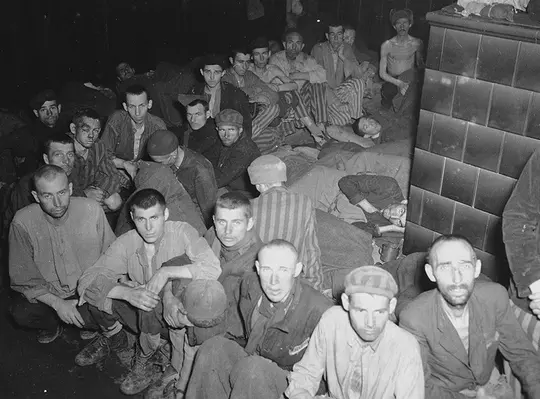
Alan Lukens went from graduating from Princeton to getting a master’s from Georgetown to teaching at St. Albans before his first overseas assignment. He’d end up meeting a woman named Polly and getting married in 1951, just before he left for Turkey.
He and Polly had three children, and Polly was six months pregnant with their fourth when he was in the Central African Republic as the chargé d'affaires. On May 10, 1961, Polly and children, as well as Lukens’ mother, flew to England without Lukens, on Air France Flight 406. Polly was going to have the baby in London. Lukens was to join them in a few weeks for the annual summer vacation and the birth.
The plane would not make it. Instead, it exploded over Algeria near the Libyan border and crashed into the Sahara, killing all 78 on board. Though the original cause was thought to be a bomb, there has never been an official confirmation or conclusion as to what actually happened. No matter what, though, Alan Lukens was now alone.
“That’s as devastating as anything a person can ever imagine,” Tim Lukens says. “I always get emotional when I think about it. There’s always been this conflict to think about it, right? It’s horrible to think about what he went through, but if he hadn’t …”
He didn’t have to finish the sentence. The point he was making was obvious — were it not for the crash, there would have been no second family, meaning him, his mother and his siblings.
“Like Dachau, he had to survive this horror,” Tim says. “But he was just such an optimist. He taught us to appreciate what you have in a positive way because of how precious life is, how precious family is, how precious friendship are. Never disregard that.”
He would leave Africa for Paris, where he began to try to wrap his arms around what had happened and move on with his life. Eventually he met Susie, then a student there, at an event at the ambassador’s residence.
“My brother-in-law was stationed at the embassy in Paris,” Susie says. “When they asked me to go to a reception at the ambassador’s, I said ‘wow.’ That’s where I met Alan. He was 17 years older than I am. I was 21. He was charming, full of life. One thing that stands out from when I first met him was that he had an extremely positive attitude towards life. I think that’s what got him through all these different challenges.”
Alan and Susie were married in December 1962. Lewis was born one year later, followed by the twin girls and then Tim. The family, like all foreign service families, traveled from post to post to post.
“It was not without its challenges, but it was a great way to live,” Lewis says. “I joined the foreign service myself and dragged my kids around the world too. It’s a lifestyle that appealed to me and appeals to me. Before the internet and cable, when were overseas, we were really overseas.”
Yes, they were. That didn’t stop him from getting back to Reunions as often as he could. And he never missed one when he was living in the United States.
And what about “reunions,” with the small “r?” These are as big a part of the Alan Lukens story as anything.
Beginning in 1995 and then every five years, Lukens would attend a reunion at Dachau, a tribute to those who died there, those who survived and those who liberated them. He went with Susie the first two times and then with Tim and his grandson Chase after that.
“It was so incredibly moving,” Susie says. “It was overwhelming. For me, going into the barracks where the prisoners were, it’s a museum now, it was extraordinary. At one of them, he met a nice French family and they connected, and he found out the father of the young man had been in Dachau and been liberated. Alan was there. We became very close. They were forever grateful.”
Each time he went back, he met new people, or rekindled old friendships. And everyone had a story. This is also Lukens, from that same interview:
A Frenchman named Joaquin Cottet was among a group of French resistance youth in a mountain town about half an hour away from Geneva, in an alpine village called Habére-Poche. At Christmas of 1943, there was a small castle there and 35 of these young people, mostly men but some girls, decided they could have a Christmas party. They thought the Germans were too far away, and that they would be safe on Christmas Day in this small castle, so they had a party. Unfortunately, someone informed the Germans. They came up in the middle of the party, and they killed all but five people, burned the Chateau. Five people played dead, but they were arrested the next day. One of them was Joaquin Cottet. They were sent from camp to camp, a horrible situation all the way through. Four of them died along the way. Only Joaquin Cottet made it. I met him in 1995 and because of that became great friends. I went back in 2000 and 2005, and in 2009 I guess it was, Susie and I went over to their village and he had died, but the son has been a very close friend ever since. They stayed with us in Washington, He kept saying, well, I was the one that saved his father. Well, I didn't, because he obviously was one of the many survivors. Through him there were two or three other veterans from that village that I've seen, they've given me their stories and so on. Another curious story from another friend, he was on a train in Germany being hauled as prisoners on their way to Dachau. The train got stuck in a little valley between two tunnels. They were all French on board. They were afraid that they would be attacked by allied planes who were bombing German troop trains. And they tore up their clothes and put on top of the freight car a red, white, and blue tri color to help the Allies spot them. And then finally, one of these guys that I met, he and a Polish friend walked back along the tracks about two miles through the Germans to where the Americans were. They got a bulldozer to go down the tracks, open it up, and pull this one car back to the American camps where they were all, of course, welcomed, and eventually brought back to life. Everybody had an interesting story. One of the wonderful people when we went back in 2010, whom I hadn't met before, but he had an English wife and he spoke English, because I had my son and my grandson along which helped. A wonderful man, and he was down to 70 pounds or something. Now he lives in southern France. But his story was really unbelievable, that every day the Germans, the Nazi guards, would count the number of bodies or the number of people standing, and thereby decide how much food would be rationed. And so so many were dying each night that they would carry the bodies out, stand them up, so that there would be a larger ration. I keep up with him. He lives in southern France, a wonderful man.
“The 65th anniversary was a great experience,” Tim says. “It was so moving. I still get teary eyed thinking about it today. My dad was honored as an official U.S. rep of the American troops who liberated the camp. He was honored by the President of Germany. It was a mix of Americans involved in the liberation and quite a few survivors. Particularly moving were the emotions of the survivors expressed to my dad and the other liberators. It was insightful, in terms of what the survivors had been through and what the liberators had experienced. It was an absolute horror what they saw, and they were totally unprepared for it. You had ground troops who were totally unaware of what they were about to see, and he witnessed it all.”
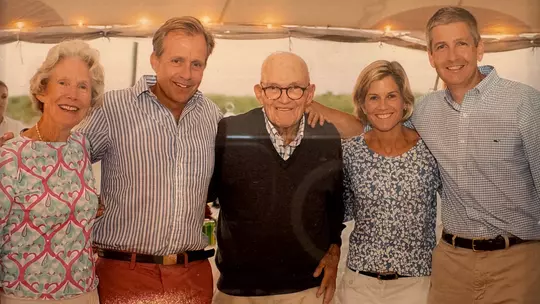
Susie Lukens is 83 now. After her life spent traveling the world ended and she and Alan settled down outside of Washington, D.C., she went back to college, earning a bachelor’s in special ed from Trinity at the age of 50.
“I took Math 101 with a bunch of 17 year olds,” she says laughing.
She would teach for 15 years after that before retiring. Her marriage would last for 57 years, until Alan passed away in 2019.
“He had been very active his whole life,” she says. “And then over two months, he just sort of faded.”
His legacy is one of public service, of family, of tragedy and of horror — and what it took to overcome the latter two.
“He was an unselfish man,” she says. “He was a very outgoing man. He was just a happy person. I don’t remember that he was ever in a bad mood.”
Maybe he was when he didn’t win the freshman sailing competition at Princeton. Maybe to him, in the moment, that was a big deal.
He couldn’t have known what was to come. He had no way of foreseeing what he would stumble across when he was 21 years old, or what would happen to his first family.
To keep going through all that, and to still be smiling and making others smile well into your 90s? That took a special man, and that’s what Alan Lukens was.
— by Jerry Price

